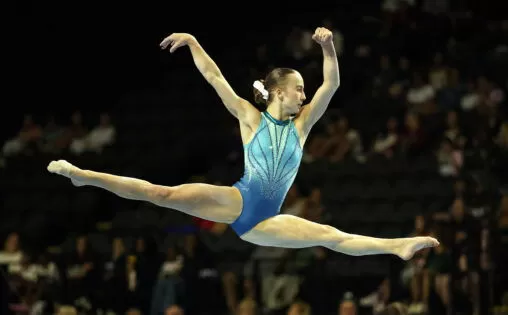Gymnastics Fans Sound Off as Judging Controversy at U.S. Classic Erupts Online
Last year’s Winter Cup saw Olympic champion Suni Lee at the center of a judging controversy that left many gymnastics fans questioning the fairness of the scoring system. Lee, known for her precision and consistency on the beam, received a score that did not reflect her visible execution after a fall during her routine. This incident once again brings to light the importance of accuracy in a sport that relies heavily on precision.
Gymnastics is a sport that demands perfection from its athletes. Every move, every step, and every leap must be executed with precision and grace. It is a sport that requires intense focus, strength, and agility. One wrong move can result in a loss of points and ultimately affect the final score. This is why any miscalculation or inconsistency in scoring can have lasting implications for the gymnasts.
The recent controversy at the U.S. Classic has sparked a heated debate among gymnastics fans. Lee’s fall during her acro series, which nullified two key composition requirements, resulted in a 5.0 D-score. This score was met with confusion and disbelief from fans, who believed that Lee’s execution deserved a higher score.
The scoring system in gymnastics is complex and often difficult to understand for those outside the sport. It is based on two components – difficulty (D-score) and execution (E-score). The D-score is determined by the difficulty of the routine, while the E-score is based on the execution of the routine. However, the judges have the final say in determining the final score, which can lead to discrepancies and controversies.
The controversy at the U.S. Classic has once again raised questions about the fairness of the scoring system. Many fans took to social media to express their frustration and disappointment with the judges’ decision. Some even questioned the judges’ qualifications and their ability to fairly score the routines.
However, it is important to remember that judging in gymnastics is a difficult and subjective task. The judges have to take into account various factors such as execution, difficulty, and artistry, which can be interpreted differently by each judge. It is also worth noting that judges are human and can make mistakes, just like any other person.
Despite the controversy, it is important to acknowledge the hard work and dedication of the gymnasts. They spend countless hours training and perfecting their routines, and one mistake should not overshadow their efforts. It takes a tremendous amount of courage and determination to perform at such a high level, and these athletes deserve our support and recognition.
The judging controversy at the U.S. Classic also highlights the need for transparency in the scoring system. Fans and athletes alike should have a better understanding of how the scores are determined and the criteria used by the judges. This would not only help eliminate confusion and controversies but also promote fairness in the sport.
In the end, it is important to remember that gymnastics is a sport of precision and accuracy. Every point matters, and any miscalculation can have lasting implications. However, it is also a sport of resilience and determination. Gymnasts must learn to overcome obstacles and challenges, both on and off the mat. As fans, we must continue to support and encourage these amazing athletes, and trust that the judging system will continue to evolve and improve.
In conclusion, the judging controversy at the U.S. Classic has once again shed light on the importance of accuracy in gymnastics. It is a sport that demands perfection, and any discrepancy in scoring can have a significant impact. However, let us not forget the hard work and dedication of the gymnasts, and continue to support and celebrate their achievements. As the saying goes, “It’s not about the destination, it’s about the journey.” And for these gymnasts, their journey is one of resilience, determination, and passion for the sport.

